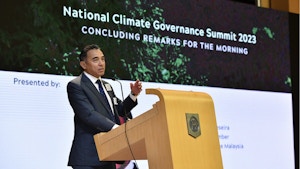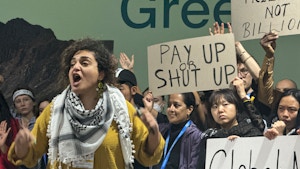Rich nations have agreed to fund US$300 billion per year until 2035 to help poorer developing states confront the devastating effects of climate change, while adopting a broader target which potentially puts US$1 trillion of climate financing on the table, ending two weeks of bitter negotiations at the COP29 talks in the Azerbaijani capital of Baku.
To continue reading, subscribe to Eco‑Business.
There's something for everyone. We offer a range of subscription plans.
- Access our stories and receive our Insights Weekly newsletter with the free EB Member plan.
- Unlock unlimited access to our content and archive with EB Circle.
- Publish your content with EB Premium.
The deal, reached at the close of the two-week summit which went into overtime on Sunday, will replace – and is threefold the amount of – an existing US$100 billion annual funding target which was met two years late in 2022. The new climate finance goal will begin in 2026.
Climate-vulnerable developing nations, however, have criticised the pledged amount designated for grants and low-interest loans as woefully insufficient to meet the scale of the climate crisis and urgent need to transition to clean energy and adapt to extreme weather events.
On Saturday, negotiators representing small island states and the least developed countries in the world staged a walkout after lamenting that they “don’t feel heard” at the talks. A draft proposal released last Friday found wealthy nations only agreeing to paying US$250 billion a year until 2035 – a figure that even COP29 host Azerbaijan described as “not fair or ambitious”.
The talks were also on the brink of collapse as delegations prepared to fly home, risking the loss of quorum for a consensus. Two-thirds of parties to the Paris Agreement must be present for decisions to be made.

Negotiators from least developed countries and island states suspend negotiations with the COP29 presidency early afternoon on 23 November, saying the text was unworkable. Image: LDC Chair
At 3am Baku time on Sunday, the final deal was adopted at the closing plenary hall in the Baku Olympic Stadium to resounding applause and a standing ovation from some countries.
But minutes later, a string of developing countries, including India, raised their objections for being sidelined in the final hour of negotiations.
India slammed deal as ‘stage-managed’
“We are hurt that we were not consulted,” Chandni Raina, negotiator and advisor of India’s finance ministry said as she addressed delegates at the closing session.
“We had informed the presidency and the secretariat that we wanted to make a statement before any decision on the adoption (of the deal). However, and this is for everyone to see, this has been stage-managed, and we are extremely disappointed with this incident,” Raina said amid applause in the hall.
India’s delegates had raised their hands in an attempt to intervene in the proceedings before the gavel fell and had walked up the stage at one point to get attention.

India’s Chandni Raina gave a passionate speech at the closing session on the early morning of 24 November, expressing frustration and disappoinment for the US$300 billion amount agreed for the new climate finance goal. Image: COP29 Azerbaijan, via Flickr
Nigeria’s Nkiruka Maduekwe, head of the government’s national council on climate change, also gave a strong statement, saying the US$300 billion deal was a “joke that should not be taken lighlty”.
“It’s not something we should clap our hands over and be forced to take it. We have the right as countries to take this or not. I am saying we do not accept this,” Maduekwe told the room.
Developing states cannot seek ambitious nationally determined contributions (NDCs) with climate funding of only US$300 billion to support them, she added. The new round of NDCs, which outlines countries’ climate actions through 2035, is due early next year. A robust global climate fund was supposed to scale up countries’ financing goals to boost their climate targets.
Indonesia, Bolivia, and Malawi were among the nations that echoed these sentiments, and reiterated their objections to the dissatisfactory deal.
The new funding will be met through a wide variety of sources, including public finance as well as bilateral and multilateral deals. The broader US$1.3 trillion annual funding goal is expected to be met mostly with private financing.
United Nations climate chief Simon Stiell described the new finance goal as “an insurance policy for humanity, amid worsening climate impacts hitting every country”.
“This deal will keep the clean energy boom growing and protect billions of lives,” he said, warning that “like any insurance policy, it only works if the premiums are paid in full, and on time.”
‘The most disappointing COP’
Mohamed Adow, campaigner from Power Shift Africa who was an observer at the negotiations between the developing states and the COP presidency prior to the walkout, told Eco-Business that the Alliance of Small Island States (AOSIS) and Least Developed Countries (LDCs) feel that their plight has not been considered when deciding on climate funding.
“This is the most disappointing COP in recent memory,” he said on Saturday, adding that the COP president had only met with the alliance once to hear their concerns. It has been reported, however, that AOSIS was present at the negotiating table in the last hour of finalising the deal. The behind-the-scenes talks also included the United States and United Kingdom representatives.
COP talks this year happened against the background of geopolitical uncertainties and follows the re-election of American president Donald Trump, known for climate pullbacks during his previous term in the White House. The oil-rich climate summit host Azerbaijan has also faced backlash for its broad support of fossil fuels.
Beyond the climate finance goal, the COP presidency announced the conclusion of negotiations regarding high-quality carbon markets, with governments agreeing to the implementation of Article 6 of the Paris Agreement after years of deadlock.
The rules are expected to govern how countries can create, trade and register emission reductions and removals as carbon credits. Trading could begin as early as 2025 once technical bodies have agreed on finer details. COP29 had earlier opened with an early breakthrough with a consensus on how to operationalise Article 6.4.














